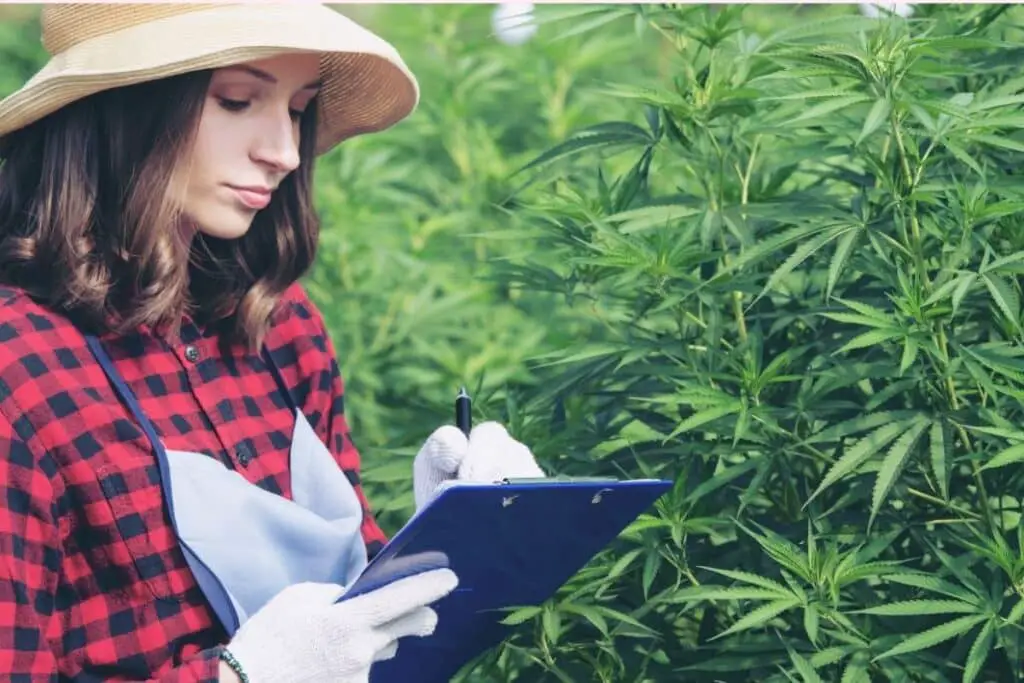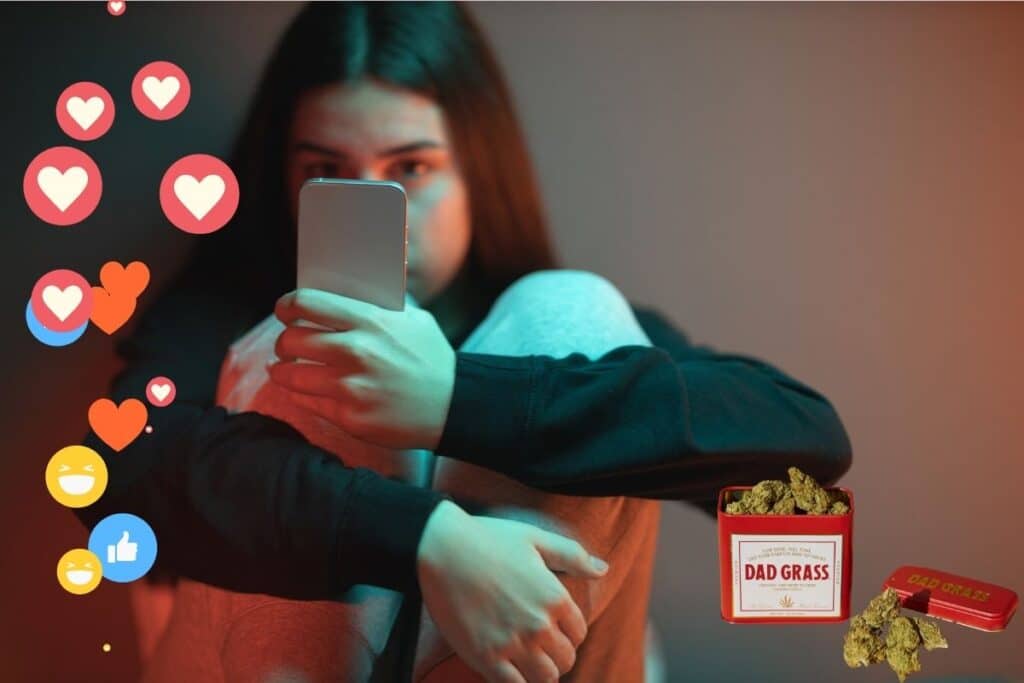Is it just me, or am I seeing more and more videos on social media of persons proudly smoking marijuana.
Then they are those showcasing their culinary versatility by making cannabis-infused edibles in an array of shapes, colours and sizes.
And me, being the avid reader of comments that I am, often head to the comment section to see what people are thinking.
And as I dive into these reviews, the majority and sometimes each and every comment is really advocating for marijuana use.
Persons are really passionate about this. They are saying that marijuana is the cure for their stress, that it makes them a better parent, that it’s the only solution for their health concerns.
Honestly, it literally feels as if I woke up one day and social media is suddenly promoting marijuana use – the very same thing that was once demonized and illegal in many parts of the world.
So I’m still confused, it just doesn’t make sense!
And a lot of social media content is made for CBD or cannabidiol which is a compound found in the marijuana plant that is thought to be safe and effective for many health conditions.
Plus, CBD doesn’t cause you to get high like marijuana does although it also has a world of unknowns, of potential harms and side effects.
But my main question is, is everyone aware of the difference between CBD and marijuana? And does promoting one also increase the use of the other?
Is the promotion of cannabis products and accessories, further normalizing and promoting cannabis use?
Cannabis Social Media Regulations
The regulations regarding cannabis promotion on social media vary widely depending on the legal status of cannabis in a particular jurisdiction.
Generally, paid ads for cannabis-related businesses are restricted.
But we all know cannabis content is still widely accessible on social media.
As the saying goes “the stricter the government, the wiser the population.”
Influencers often navigate a “gray zone” where they have the leeway to promote their personal use of cannabis and offer recommendations without engaging in direct sales.
Some users may employ creative language or imagery to discuss or depict cannabis without explicitly using the terms “cannabis” or “marijuana.”
This makes it more challenging for automated content moderation systems to identify and flag such content.
But I don’t like it one bit and that’s why I’m here creating this video even though I know this is a very controversial topic and most people will disagree with me.
And it’s because I’m so passionate about this topic and I’ll let you know exactly why.
BTW, I’m not saying I am totally against the use of cannabis – in any of its forms. I’m going to be addressing the pros and cons of marijuana use in another video.
But what I am against are those 20 second videos of young, healthy, beautiful adults proudly smoking marijuana, or praising its use without providing absolutely any information about its potential consequences..
It’s videos like these, coupled by the fact that I see marijuana stores all over the place.
You walk one corner in Toronto and you see two or three marijuana stores – and I’m not exaggerating.
And these stores are even better than the supermarkets because they are open 24/7. So you can’t purchase bread after 10 pm but you can get marijuana at midnight.
Anyways that’s not the point of this post.
And this is not me being jealous because these channels have hundreds of thousands of followers and I’m just sitting here with a mere 300. No No No No No
My grievance boils down to this one fact: Our children and the next generation – don’t stand a chance – not with marijuana being thrown in their faces like this.
One study showed that 93.6% of the participants, who were all adolescents, were exposed to cannabis marketing on at least one social media platform, with exposure on Facebook being the highest – when compared to Instagram and Twitter.
This study was published in 2019 so of course things could have changed since then.
But what I wanted to highlight is that the research claims and I quote “adolescents with higher than average exposure reported more frequent cannabis use,
stronger intentions to use cannabis in the future, more positive expectations about cannabis use, and more negative consequences from cannabis use.”
Is social media the gateway to cannabis culture?
Platforms like Instagram, Facebook and Twitter have become popular among cannabis enthusiasts, who use these platforms to share information, images, and experiences related to cannabis use.
While these platforms can educate the public and counteract negative stereotypes and misconceptions about cannabis, they can also expose non-users to cannabis culture and normalize its use.
Educational Gaps Regarding Cannabis Use:
While I appreciate that social media is a platform for personal expression, the brevity of these videos often overlook – actually, they completely ignore -the complexities associated with marijuana use.

Responsible Messaging
Over the past decade, there has been a significant increase in the legalization of cannabis for both recreational and medicinal purposes in various parts of the world.
Countries such as Canada, Uruguay, and several U.S. states have legalized recreational use, while many others have allowed medical cannabis.
One could only hope that we are not creating more problems for ourselves – more health risks that we will only recognize a decade too late?
If you listened to my previous video about Why it’s so hard to quit smoking you might notice a similar trend in the evolution of cannabis use and historical evolution of smoking tobacco, particularly in terms of changing perceptions, legal frameworks, and public health considerations. Here are some parallels:
Changing Societal Attitudes to Cannabis Use:
- Both tobacco and cannabis have experienced shifts in societal attitudes over time. Tobacco, was once widely accepted and even glamorized.
- Smoking ads were all over the radio and TV. Similarly, cannabis has transitioned from being stigmatized to gaining more acceptance, especially with the increasing acknowledgment of its potential medical benefits.
But now we have an even more powerful weapon to glamorize cannabis. We have the internet, social media, and influencers.
And every teenager has a phone. I just want us to pause and assess what a few years could look like if we continue like this.
Medical and Recreational Legalization of Cannabis:
Both tobacco and cannabis have undergone shifts in legal status.
Tobacco was historically unregulated and widely accessible, but over the years, regulations have been implemented to address health concerns, including restrictions on advertising and public smoking.
Fortunately, some territories do regulate cannabis advertising, and require that advertisements provide factual information and not be misleading.
However, we need to start realizing the power of influencer marketing.
Instead of solely showcasing the act of smoking or praising its use, content creators should consider incorporating information about legal implications, potential health risks, and responsible consumption practices.
A more balanced approach can help viewers make informed decisions and better understand the broader context of marijuana use.
Have you seen social media videos of how cannabis has impacted educational and career goals? Of how it’s affected memory and cognition?
Because the persons in the comment sections mentioning that they have smoked marijuana for 40 years and are still healthy and strong, are not giving you the full information.
These are anecdotal accounts that do not reflect the full spectrum of outcomes. It’s important to recognize that the impact of marijuana use varies from person to person.
While some individuals may have positive experiences, others may face challenges or adverse effects.
And the ones that are already addicted or facing the negative health consequences are not creating social media shorts – they are often less likely to share their experiences openly.
They are grappling with their addiction – fighting to survive.
Simply put, many social media videos are downright misleading.
And we need to find them concerning, especially for younger individuals who may underestimate the potential negative effects and the addictive nature of cannabis.
Perceived Normalization of Cannabis:
Positive portrayals of cannabis use on social media will inevitably contribute to the normalization of its consumption – especially among impressionable individuals.
This will make cannabis use more acceptable and commonplace. This normalization will influence perceptions, particularly among younger individuals, and will lead to increased experimentation.
No one wants to deal with stress, anxiety or depression – when they have cannabis as the easy, widely available solution – one that often doesn’t require a medical consultation or prescription.
Peer Pressure and Social Influence of Cannabis Use:
Social media around cannabis use will amplify peer pressure and social influence.
Are these positive portrayals of cannabis use contributing to a social environment where individuals feel pressured to conform to certain behaviors, even if it’s not in their best interest?

Potential Legal Consequences of Cannabis Use:
In regions where cannabis use is still illegal, social media content portraying its positive aspects without emphasizing legal restrictions may inadvertently encourage illegal activities, leading to potential legal consequences for users.
Protecting Vulnerable Audiences:
Younger individuals and those who may be more susceptible to social influence need protection from potentially harmful content.
This is particularly important as the impact of social media on shaping attitudes and behaviors cannot be fully understated.
But what we do know for sure is that changes in societal norms – often have significant consequences, both positive and negative, across various generations
Encouraging Open Dialogue About Cannabis:
Rather than promoting an exclusively positive or negative stance, social media content on marijuana should encourage open dialogue.
Creating a space for discussions about personal experiences, challenges, and lessons learned can foster a more inclusive and informative community.
This approach respects individual choices while acknowledging the diverse perspectives surrounding cannabis use.
I can do a whole thesis, a whole book on this. But then again no one would buy it so I’m doing this video instead.
I’m open to changing my views on any topic but with good reason. Does anyone agree with me? Is anyone else worried about this changing trend?
I am known for being risk averse, so maybe I’m just overthinking and overanalyzing again? Let me know your views in the comments.
Again I would like to reiterate my intention is not to demonize marijuana use but to advocate for a more responsible and informed approach in its portrayal on social media.
By addressing the complexities, providing educational content, and fostering open conversations, we can contribute to a healthier and more supportive online environment for individuals making choices about their use of cannabis.
Stay tuned for my upcoming video where I’ll delve deeper into the pros and cons of marijuana use.
Reference:
Related Post:
Is Cannabis HARMFUL or HELPFUL to Your Body & Mind?? What You Need to Know About Marijuana/Weed!!









